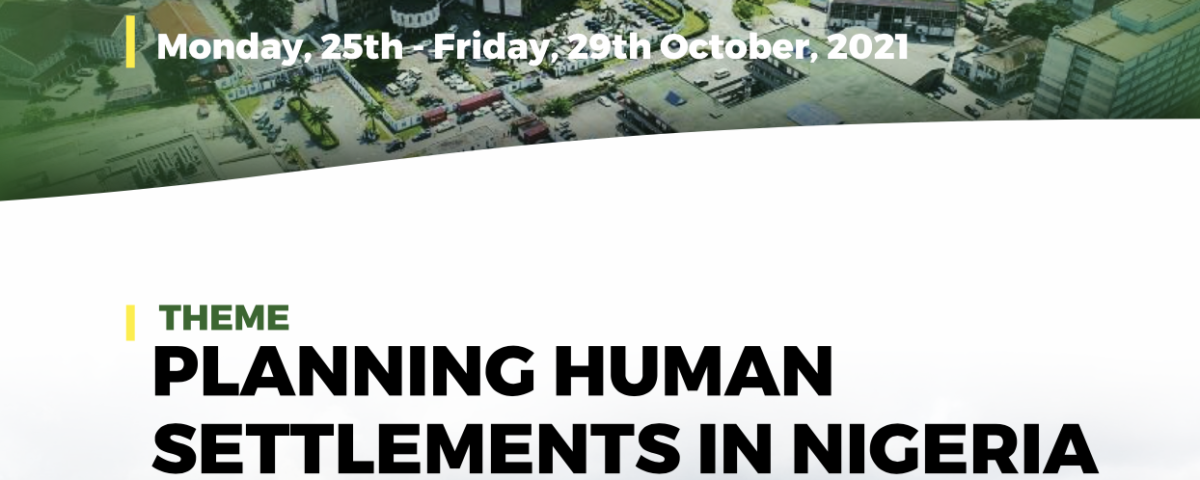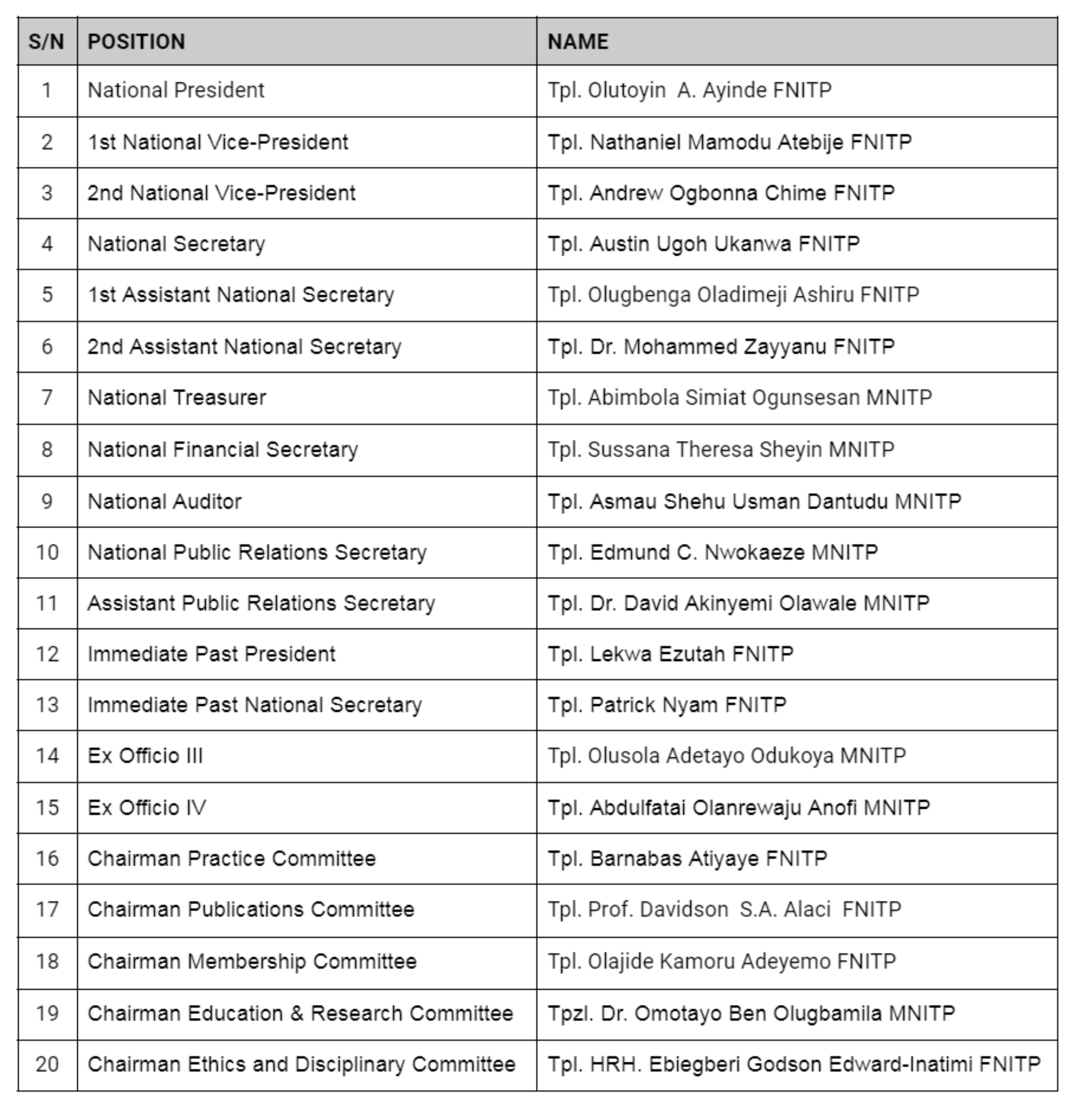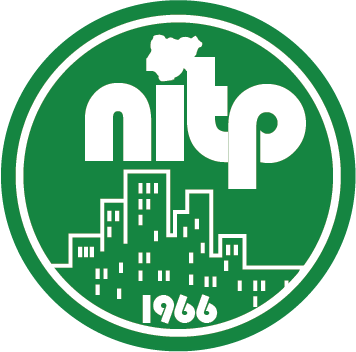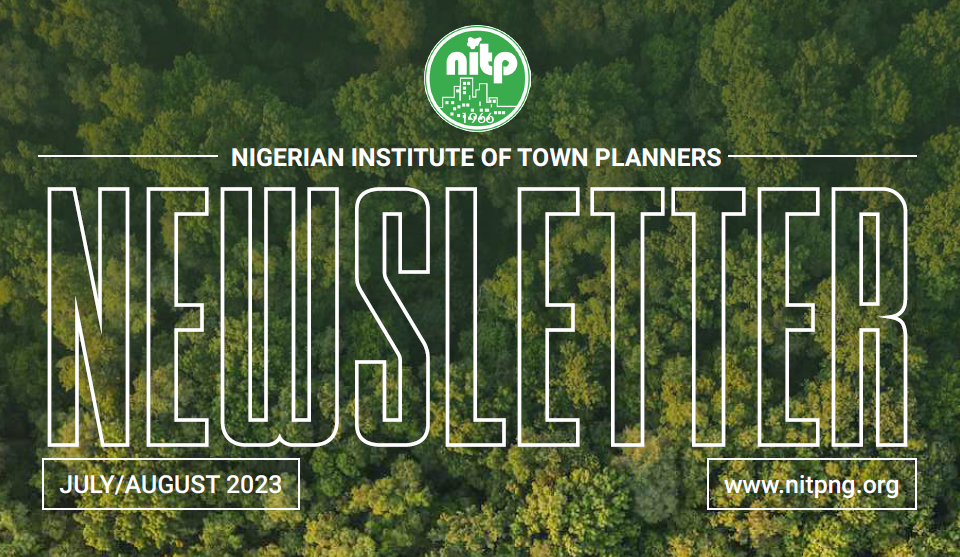COMMUNIQUÉ ISSUED AT THE 52ND NATIONAL CONFERENCE/ANNUAL GENERAL MEETING OF THE NIGERIAN INSTITUTE OF TOWN PLANNERS (NITP) HELD AT L.A. KINGS (BON) HOTELS AND EVENTS CENTRE, No. 31, KEN SARO-WIWA ROAD, PORT-HARCOURT BETWEEN MONDAY, 25TH OCTOBER TO THURSDAY, 28TH OCTOBER, 2021

1.0 Preamble
The Nigerian Institute of Town Planners (NITP) members converged on Port-Harcourt from Monday 25th October to Thursday, 28th October 2021, for the 52nd National Conference/Annual General Meeting. The meeting was held at L.A. Kings (BON) Hotels and Events Centre No. 31, Ken Saro-Wiwa Road, Port-Harcourt.
The Conference was attended by 1082 participants, with 16 papers presented in four parallel sessions. The lead paper entitled “Planning Human Settlements in Nigeria for Resilience and Sustainability”, was presented by Dr. Iorwuese Viashima, MNITP, and moderated by Tpl. Moses Ogunleye, FNITP. The Conference had a session coordinated by Arctic Infrastructure, a private-sector infrastructure financing advisory and development organisation. It focused on urban infrastructure financing with six (6) resource persons, including four (4) international development specialists.
The Conference was declared open by Tpl. (Chief) Donatus Obialo, FNITP, Past President and Chairman, College of Fellows. The River State Chapter Chairman, Tpl. Emmanuel Ikechukwu, MNITP, in his welcome address, enjoined participants to explore rich opportunities of the Garden City. The National President, Tpl. Olutoyin Ayinde, FNITP, gave the opening remarks. Goodwill messages were delivered by the President of Town Planners Registration Council of Nigeria (TOPREC), Tpl. Isyaku Mukhtar Kura, FNITP and the President, Association of Town Planning Consultants of Nigeria (ATOPCON), Tpl. Muyiwa Adelu, FNITP. The keynote address was delivered by the Honourable Minister of Works and Housing, Babatunde Raji Fashola, SAN. He harped on the unique role of town planners in nation-building. According to the Hon. Minister, “the two most important officers in government, should be the Town Planner and the Economic Planner, in that order.” He therefore urged planners to bear in mind the broad objectives of the Sustainable Development Goals (SDGs) which seek to improve the quality of human life while planning human settlements in Nigeria for resilience and sustainability.
2.0 Observations
The Conference observed the following:
- City resilience is a complex phenomenon that is affected by a multiplicity of factors. Cities must be able to evolve and adopt key responses to changing circumstances.
- Climate change and general climatic variability is a major cause of rising environmental issues, including flooding, coastal erosion and desertification.
- Flood poses a significant threat to the habitability and viability of human settlements. Globally, flood has led to psychosocial stress on human beings, including but not limited to socioeconomic wellbeing and mobility of inhabitants in flood-ravaged areas.
- In Nigeria, the institutions saddled with managing flood risks at the various tiers of government are not proactive in dealing with flood-related events.
- Vast agricultural land used mainly for rice cultivation in northwest Nigeria is predisposed to flooding. This portends an existential threat to food security, livelihood and wellbeing among others.
- Crises and violent conflict-induced migrations have become central stimulants in the rapid urban growth in many African cities. Resultantly, many Internally-Displaced Persons (IDPs) are found mostly in cities with statistics suggesting an unbearably 17–20-year timeline before IDPs could return to their places of origin.
- The relationship between the host communities and IDPs is averagely but dangerously tending towards hostile arising from competing demands for land resources and mischaracterisation of IDPs as criminals by the natives. Hence, the engagement of IDPs in public spaces is generally poor.
- Plan preparation builds upon a range of approaches such as consultation, engagement, and codesign. Consultants or drivers of coproduction must be highly skilled in stakeholder engagement to ensure success and minimise end-users’ resistance to planning products and project deliveries.
- The continued neglect of the implementation and domestication of the Nigerian Urban and Regional Planning Law 2004 (as amended) is responsible for most of the physical, environmental, social and economic challenges bedevilling the country.
- The country cannot attain sustainable development and resiliency with the unabated depletion of green spaces for economic gains through urban development.
- Human settlements in Nigeria are gradually degenerating, with several losing their known identities of aesthetics and functional qualities. It is noteworthy that some state governments are replacing outdated master plans to address emerging problems. Attempts at reviewing inoperative ones are also encouraging, though at abysmally slow pace. This could go a long way in tackling many identified problems and aid the pursuit of sustainability and resilience agenda.
- The absence of master plans and non-implementation of existing ones is a major explanation for the haphazard physical development and decay across human settlements in Nigeria.
- The disregard or low credence to Non-Motorised Transportation (NMT), such as trekking and cycling is worrisome. The low patronage is attributed to lack of needy infrastructure, security and safety concerns, and societal value systems.
3.0 Recommendations
Given the above observations, the Conference made the following recommendations:
- Risk assessment should be coordinated and consistently pursued with modern and practical approaches towards flood-risk abatement.
- Owing to the impact of flooding in severing social ties and community integration, it is instructive to proactively develop a flood risk abatement plan, including capacity training of state actors on flood emergency management.
- There is now an urgent need to review and implement the Nigerian Urban and Regional Planning Law of 2004 (as amended) and its domestication by all federating states, in line with the peculiarities of individual states. This is fundamental to providing solutions to the myriad of socioeconomic and environmental challenges.
- The preparation and implementation of master plans to mitigate flood disaster and other physical, economic and environmental challenges in human settlements in Nigeria are now urgent agenda.
- In addressing the need for integration of IDPs in their respective host communities, public spaces near IDP camps should provide diverse and free access to recreational activities for IDPs. City designers and policymakers should consider integrating hybrid recreation spaces in the planning of cities rather than traditional models of parks and gardens.
- Sustainability and resilience strategies should govern resource utilisation and management to withstand shocks and aid recovery rates. Government must prioritise growth-stimulating infrastructure, including transportation systems and communications, among others.
- Planning standards and zoning codes need to be strictly adhered to. Government should intensify campaigns and public enlightenments against developing without development permits from appropriate authorities.
- Indigenous approaches should be imbibed and developed as against foreign and alien techniques in safeguarding our treasured local values.
- Government should address the challenge of continued depletion of green spaces for transient economic gains. Public enlightenment is advised to curb similar bad practices from the citizenry to promote greenery.
- There is need for unambiguous and prescriptive legislative instruments and policies on green area development and protection.
- The Rivers State Government is advised to review the Port-Harcourt Master Plan of 1975 and the Greater Port-Harcourt City Development Plan of 2009.
- Promote active involvement/participation of stakeholders in the planning process, particularly in the regeneration of neighbourhoods and urban communities. As a precursor, slum mapping should be carried out across the board to determine the intensity of decay and guide in adopting the appropriate method for renewal.
- Government should collaborate with financial institutions and other stakeholders towards upgrading slum areas using people-centric strategies.
4.0 Conclusion
The Nigerian Institute of Town Planners hereby submit that the sustainability and resilience of human settlements in Nigeria and the general physical and economic development of the country is strongly dependent on the level of physical planning as articulated in the recommendations. The Conference ended with the Annual General Meeting where the following officers were re-elected to serve in the National Executive Council of the Institute for the year 2021/2022.

The newly-elected National President, Tpl. Olutoyin Ayinde, FNITP, on behalf of the newly elected National Executive Council (NEC), in his acceptance speech, promised to work assiduously with his team to surpass the feat of the past 12 months.
Signed
Tpl. Edmund Nwokaeze MNITP
National Public Relations Secretary


